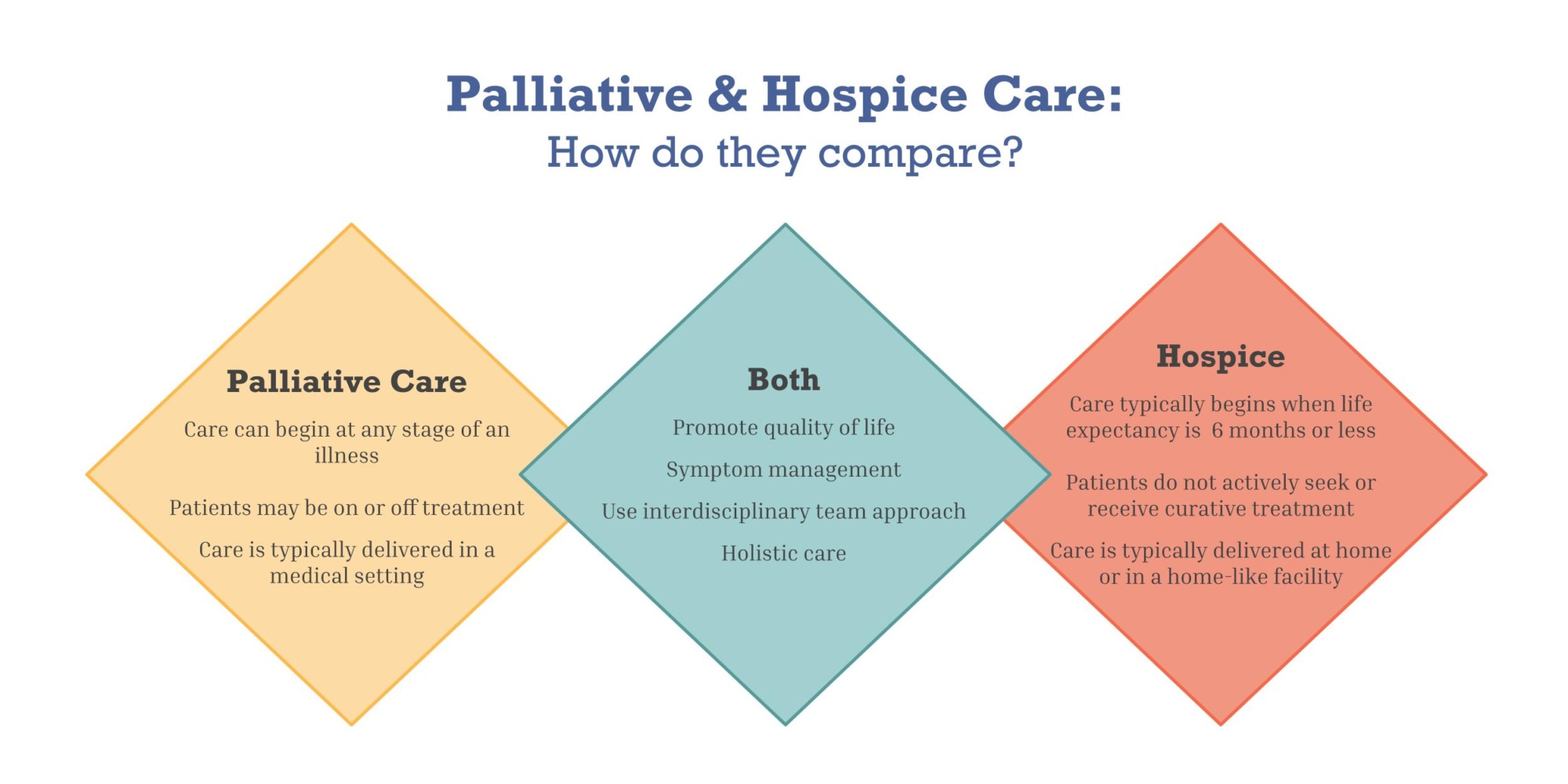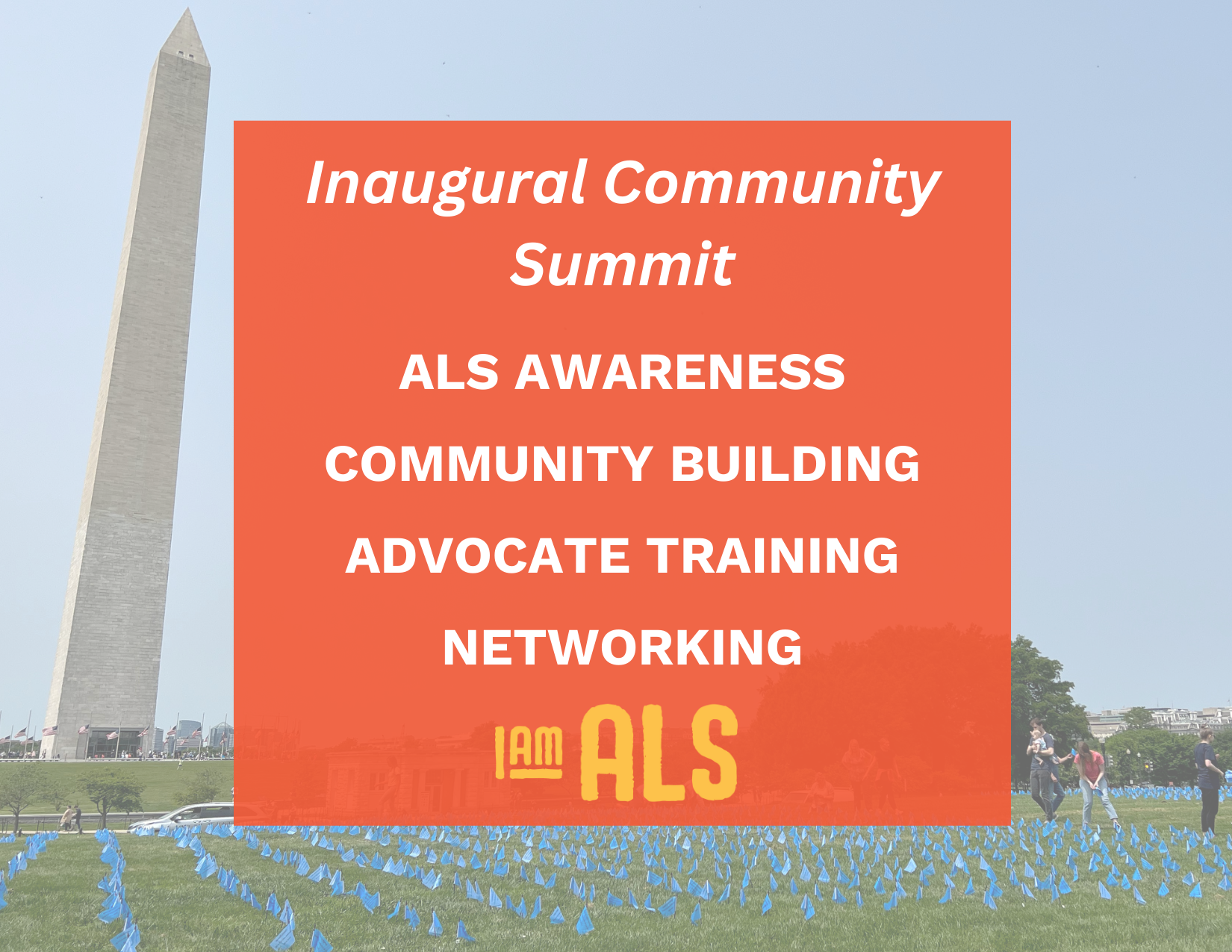Palliative and Hospice Care for ALS

If you’ve heard the words palliative care and hospice frequently, but you’re not sure of the difference between the two — don’t worry, you’re not the only one! While both palliative and hospice care provide compassionate care and comfort to patients, there is a distinct difference between the two. Palliative care is available to patients from the moment of diagnosis and aims to support a high quality of life and reduce suffering. On the other hand, hospice care is typically available toward the end of life when patients are no longer seeking treatment.

Palliative care
What is it?
Palliative care is a whole-person approach to care that promotes quality of life and relief from pain and symptoms for an individual living with a serious illness or disease. Designed to identify and meet the needs of the patient, palliative care specialists take into account patients’ physical, emotional and spiritual values and needs. Palliative care specialists can help you manage symptoms including pain, anticipate future needs and provide practical guidance, as well as help you cope with the emotional impact of ALS for you and your family. While not specific to end-of-life care, palliative care can assist with end-of-life decision-making and help ease the transition to hospice care should this become necessary.
Receiving palliative care does not mean you are “giving up” or you will be unable to take any medications or supplements. Rather, its focus is on support — to help you live on your terms as well as to help you and your family cope with the impact of ALS.
When should I start?
Palliative care is recommended to be discussed and implemented as early as possible. While it can begin at any stage of ALS, introducing it at the time of diagnosis is ideal to address symptoms as they arise as well as to help anticipate and plan for future needs. It also provides you and your loved ones with an outlet to address spiritual and emotional concerns including goals for care, anxieties and fears, as well as values that add meaning to your life. Consider identifying and communicating your values ahead of time using this checklist of questions, or going through this with your palliative care specialist.
Tip: if you don’t have a palliative care specialist, contact an I AM ALS Navigator for support with completing the values checklist.
Palliative care at the end of life
While palliative care is not the same as end-of-life or hospice care, it can be helpful in preparing for future needs related to end of life, including advanced care planning. This ensures your loved ones and your health care team are aware of and understand your care preferences in a way that honors your values.
How can I access it?
Some ALS clinics may have a palliative care specialist on their multidisciplinary team, so be sure to ask your neurologist or nurse about this. If your clinic does not have a palliative care specialist, talk with your doctor about options in your area that are right for you and ask for a referral. Using this Palliative Care Provider Directory may be helpful in identifying a specialist near you. Be prepared ahead of time with a list of questions that you can use when interviewing specialists or when meeting with your palliative care team for the first time.
Hospice Care
What is it?
Hospice promotes quality of life at the end of life. The goal of hospice is to be person-centered and holistic, providing not only comfort and relief of physical symptoms for an individual at the end of their life, but to also address emotional, spiritual and bereavement needs of the family as a whole. It does not seek to prolong life nor is it an indication of “giving up.” Rather, hospice is a care model that provides comfort when patients no longer seek treatments or cures and promotes a dignified death while supporting you and your family throughout the process.
When should I start?
Hospice is typically initiated when one’s care team deems life expectancy to be six months or less. However, with ALS, it may be necessary to start looking into hospice earlier. Here are some general guidelines on what criteria makes someone with ALS eligible for hospice.
How can I access it?
Hospice may be provided wherever home may be, whether it is at a primary residence, a nursing home or in the home of a loved one or caregiver. There are even full-time hospice facilities to consider. Hospice may be accessed through independent agencies that are designed to provide hospice care or through programs based in hospitals, nursing homes or assisted living facilities.
For those receiving in-home hospice care, a nurse or other member of the multidisciplinary hospice team will check in on you regularly and are always available by phone 24/7. For those who receive care in another location outside of the home, routine visits or around-the-clock care may be options depending on the location, your needs and your insurance. Regardless of the setting, hospice is designed to be available 24/7 in order to meet your needs and the needs of your family at the end of your life. See Your ALS Guide on hospice care to learn more about financial considerations, hospice respite care and how to locate a hospice provider that fits your needs.
The most important element is to have the conversation around hospice and to let your preferences be known. Talk with your loved ones and health care team about your values, preferences and care options. Know that the decision is ultimately yours, and you have the right at any time to change your mind about what treatments and care you’d like to recieve.
How can I pay for hospice?
There are multiple ways in which your hospice care may be covered, whether partially or in full. More information on how your care may be covered include:
- Medicare has a hospice benefit for which you may be eligible.
- Medicaid hospice benefits are optional and vary by state.
- For those who have served, the Veterans Affairs (VA) also covers hospice care.
- Private and/or employer-sponsored insurance plans often offer a hospice benefit, but each plan differs on the extent of hospice care and services they cover.
- If you do not have insurance, or your insurance does not fully cover the costs of your care, you may have to pay for some services through private or self pay. If that is the case, check with your hospice care team to see what offers, payments plans or resources you may be eligible to receive.
Resources
Get Palliative Care. ALS & Palliative Care.(2020).
Oliver, David. Palliative Care in Amyotrophic Lateral Sclerosis: From Diagnosis to Bereavement. Oxford University Press. 2014.
Your ALS Guide. Hospice Care. (2020).
You might find these helpful:

We're here to help with the challenges of ALS
Connect with an ALS Support Specialist today
Have questions? Call us at 866.942.6257 between 9 a.m. - 5 p.m. or email us
